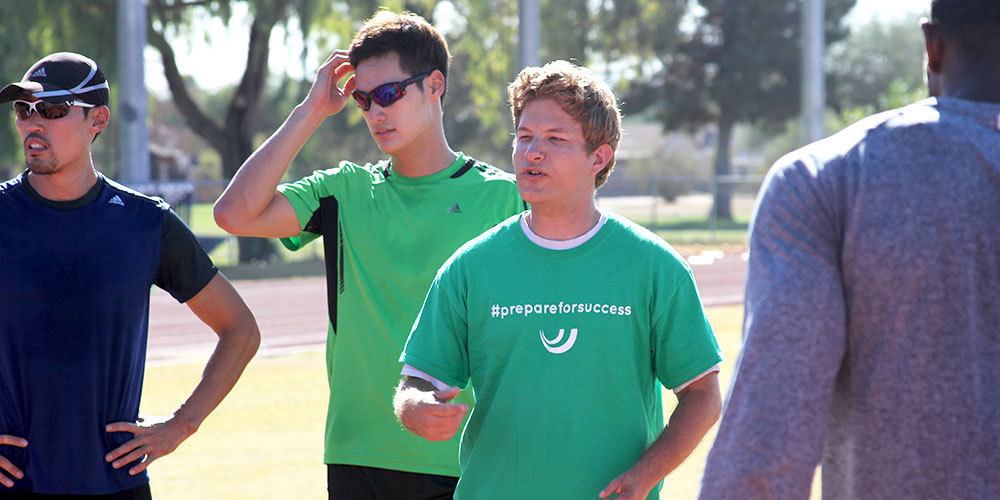Energetic, intelligent, driven – Andreas Behm is the epitome of a professional coach, who has achieved outstanding success in his own career despite his relative youth in the profession.
Following an eight year stretch holding a position with the Texas A&M Track & Field Program, Coach Behm joined Altis in 2013 as Recruitment Director & Sprints and Hurdles Coach.
Andreas’ current group includes Aries Merritt – who in 2012 had outstanding success under his tutelage – winning the World Indoor title in 60 hurdles; claiming an Olympic gold medal in the 110 hurdles, and then wrapping up a stellar season with a world record of 12.80 seconds. Behm who was mentored amongst others by Coach Dan Pfaff, has also coached athletes during the U.S. Olympic Trials (2008, 2012), World Championships (2009, 2011, 2013), and Olympic Games (2008, 2012) in addition to numerous NCAA and USATF Championships.
Drawing on his knowledge and experiences, we asked him to share his top 5 tips on becoming a better coach for aspiring young coaches hoping to follow in his footsteps:
1. Find mentors
One of the main contributors to my growth as a coach in this sport, is the good fortune to have had some really great mentors. Coaches who in some cases have been coaching for longer than I have been alive were willing to take me under their wing and share their experience, successes and mistakes with me. A lot of them saw even more potential in me than I saw in myself at the time. They allowed me to immerse myself in their system and learn why it worked so well. I would recommend to any young, aspiring coach to seek out successful experienced coaches and learn from them.
2. If you at first can’t see it, look again
When I first started, my technical eye was not very good. I would come out to the track and I seemingly could not pick up anything the more experienced coaches could see. I learned over time that this is a very acquired skill. I have spent countless hours just observing practices, watching whole bodies in movement, zeroing in on individual body parts, specific movements, individual components of an event. Not to mention even more time scrutinizing and breaking down video: forwards, backwards, slow motion, frame by frame etc. Over time you will be able to see a lot more detail in real speed and at some point certain elements seem to slow down quite a bit and you are able to replay them in your head. Just remember, if you can’t see it right away, keep working on it. Developing a coaches’ eye takes time.
3. Find enjoyment in repetitive tasks
This really applies to both coach and athlete. Track is not a sport where one can play a lot of games in practice. One hones one’s craft by performing seemingly the same task over and over again … only to come back to do it some more. It is important as a coach to find enjoyment and challenge in fine tuning these repetitive tasks as well as imparting the importance and accomplishment to the athlete. Young coaches need to find discipline, patience and precision in these tasks to succeed in a sport that is often determined in milliseconds and centimeters.
4. Revel in your Set Up
I am always very hands on when it comes to setting up my workouts on a day to day basis. I am precise and particular and expect as much from my assistants and athletes. Through years of setting up every aspect of workouts I have gained a deeper appreciation and understanding of what I want to accomplish that day. Setting up lets me understand the spacings on the track, the patterns, the rhythms that are a part of this sport. It allows me to go through the sequencing of different exercises and drills as well as the overall flow of the workout. Not to mention, when I am setting up, I often find creative inspiration to try something new or improve upon an existing concept. So please do not view set up as a menial task, view it as an opportunity to gain a deeper understanding of each and every aspect of a given workout and event.
5. Take Notes
To this day I always have a notebook with me, where I write down interesting observations and things I learn. Sometimes learning opportunities present themselves in the least expected moments, so it is important to be prepared. I now have a collection of notes dating back 15 years about various coaching philosophies, technical models, workouts etc. that I can use as a guide and source of reference. You will be amazed at the amount of great information one can collect in one year by simply writing down a few sentences every other day!
You can follow Andreas on Twitter @CoachSanAndreas

